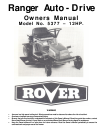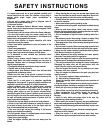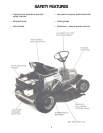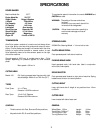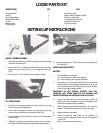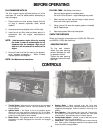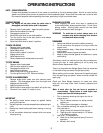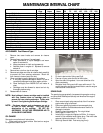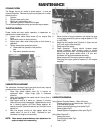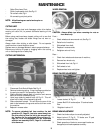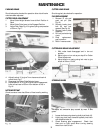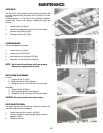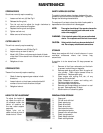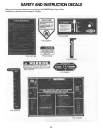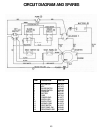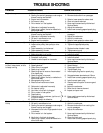OPERATING INSTRUCTIONS
AUTO – DRIVE OPERATION
Forward and backward movement of the mower is controlled by the drive selector pedal. As with a motor vehicle,
speed is controlled by the amount of pressure on the drive selector pedal. Ensure that the mower user is familiar with
this means of operation before operating the mower, particularly in tight or confined areas.
TO START ENGINE
NOTE: The engine will not start unless the cutter drive is
disengaged, and clutch/brake pedal is depressed.
1. Depress clutch/brake pedal – Apply the parking brake
2. Move the drive selector to neutral
3. Disengage the cutter drive
4. Move the throttle lever to the choke position
5. Turn the ignition key to the start position and release
when the engine starts
6. Move the throttle lever to about ¼ position
TO MOW OR DRIVE
1. Depress clutch/brake pedal
2. Disengage the parking brake
3. Select height of cut
4. Move throttle to about ¾ position
5. Engage cutter drive
6. Select desired drive
7. Slowly release clutch/brake pedal to move off
TO STOP ENGINE
1. Depress clutch/brake pedal
2. Shift the drive selector to neutral
3. Disengage the cutter drive
4. Apply the parking brake
5. Move throttle lever to the slow position
6. Turn the ignition key to OFF. Remove the keys
TO STOP IN AN EMERGENCY
1. Depress brake/clutch pedal and drive selector pedal
together. (This disengages power from the engine and
engages the disc brake)
2. Apply park brake and lock
3. Move throttle to slow position and switch off ignition key
4. Dismount from mower if it is safe to do so
IMPORTANT
1. The parking brake should always be applied before
leaving the machine
2. The parking brake must be released before attempting to
drive
3. Depress the clutch/brake pedal-when starting or coming
to rest
4. Do not use sudden directional reversal which can cause
wheel spinning
ENGAGING CLUTCHES
When engaging the cutter drive lever or releasing the
clutch/brake pedal, always operate slowly. Do not use a
jerking motion. Moving these controls too fast could
possibly overload and stall the engine.
WARNING: To avoid loss of control always come to a
complete stop before changing drive direction
and slow down before turning.
REMEMBER
1. Always look behind the machine before reversing
2. Do not refuel when the engine is running or while the
engine is hot
3. Keep bystanders away – Keep hands and feet clear of
moving parts
4. Keep machine clean of grass and debris
5. Keep all safety devices (guards and switches) in place
and working
Periodically check the machine and the cutting mechanism.
If parts are worn or need replacing do so by using only
Genuine Rover Replacement Parts.
There is a comprehensive Ranger Spare Parts List contained
in this book to help you select the right part quickly.
Before working on the mower, disconnect the spark plug lead
from the spark plug and place it where it cannot contact the
spark plug.
Check your Rover Ranger frequently for loose nuts, bolts,
belts etc, and keep these items correctly tightened and
adjusted.
Note: A check after the first two hours of operation is
recommended. Engine failure or rapid engine wear
mainly result from the following causes –
1. Dirt or abrasives entering the engine via the air
cleaner due to –
a. The air cleaner element not being serviced
regularly, or
b. The air cleaner damaged or dislodged
2. Dirt or abrasives entering the engine via the oil
filler tube due to –
a. Using a funnel not cleaned of dirt and grit,
b. Topping up with contaminated oil. Oil stored
in an unclean container
3. Lack of oil. It is important to –
a. Check the oil level regularly (every 5 hours of
operation)
b. Maintain a full sump
5



